Ibaraki: 27 Things to Do, Culinary Delights, and Travel Tips

Discover 27 best things to do in Ibaraki, from Hitachi Seaside Park to hidden gems. Explore top scenic spots, local food, and travel tips near Tokyo.
Ibaraki: The Perfect Day Trip Destination from Tokyo
Ibaraki is located north-east of Tokyo, bordering Chiba, Saitama, Tochigi, and Fukushima prefectures. It is the 11th largest prefecture in Japan, with a population of around 2.84 million. Mito City is the prefectural capital.
Ibaraki: Top Things to Do and Famous Places to Visit
1. Hitachi Seaside Park
2. Kairakuen Garden
3. Mito Castle
4. Oarai Isosaki Shrine
5. Sakatsura Isosaki Shrine
6. Kasama Inari Shrine
7. Hoshiimo Shrine
8. Kashima Jingu Grand Shrine
9. Mount Tsukuba
10. Ushiku Daibutsu (Giant Buddha Statue)
11. Ryujin Suspension Bridge
12. Nakaminato Fish Market
13. Fukuroda Falls
14. Tsukuba-Kasumigaura Ring-Ring Road
15. Suigo Itako Iris Garden
16. Oiwa Shrine
17. Ibaraki Prefectural Museum of History
18. Amabiki Kannon Temple: Beautiful Hydrangeas!
19. Hananuki Gorge: A famous Fall Foliage Spot
20. Hitachi Station: Splendid Architecture!
21. Osugi Shrine
22. Tsuchiura All Japan Fireworks Competition
23. Tsukuba Space Center
Ibaraki Food and Souvenirs
24. A Must-Try in Ibaraki! Hitachi Beef
25. Japanese Sweet Potato Confections - The Latest Hit Souvenir!
26. A Local Delicacy: Monkfish Hot Pot (Anko Nabe)
27. Hitachi Aki-Soba Noodles
How to Access Ibaraki: Airplane, JR Lines, and Rental Car
1. Hitachi Seaside Park

Photo by Pixta
Hitachi Seaside Park is one of the most famous spots in the prefecture.
It is located in Hitachinaka City by the Pacific Ocean. From JR Katsuta Station, ride the bus departing from the east gate to bus stop No. 2. It is a 15-minute ride to Kaihin Koen West Entrance (Nishi-guchi) bus stop and 20 minutes to Kaihin Koen South Entrance (Minami-guchi) bus stop.
While the park is known for its nemophila blooming in late April and kochia blooming in late September, the grounds are full of flowers year-round. Visitors can enjoy the scenery regardless of the season.
2. Kairakuen Garden

Photo by Pixta
Kairakuen, located in the prefectural capital of Mito City, is one of the three major gardens in Japan. From Mito Station, it is a 20-minute bus ride to the facility.
The best season to visit is February when the ume (plum) flowers bloom. While cherry blossoms attract crowd-goers, the plum blossoms in Kairakuen should not be missed!
3. Mito Castle

Photo by Pixta
Mito Castle, situated north of Mito Station, was the former residence of the Mito Tokugawa family, second in status to the Tokugawa shogunate family. It ranks among the top 100 Japanese castles chosen by experts.
Visitors can see the Otemon, a gate formerly used by people of high status. There's also the sumiyagura (corner tower), built to defend the castle, and Kodokan, a building designated as a special historic site by the Japanese government.
4. Oarai Isosaki Shrine
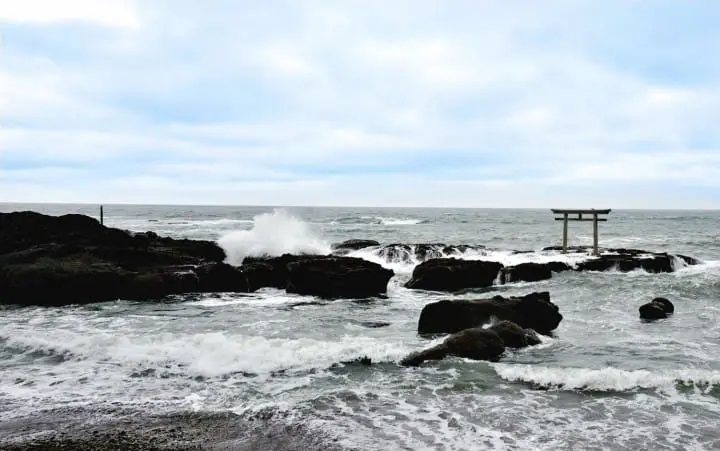
Photo by Pixta
While there are many torii (gateway to a Shinto shrine) standing in oceans and lakes, the torii at Oarai Isosaki Shrine may be the most mystical.
It is also known as a place to view the sunrise, with many people gathering to snap photos of the sun rising from the horizon and above the torii.
It takes about 15 to 20 minutes from Mito Station to the shrine by bus or car.
5. Sakatsura Isosaki Shrine

Sakatsura Isosaki Shrine is located on a hill near the Isosaki fishing port.
Sakatsura Isosaki and Oarai shrines are said to be related, with shrine-goers worshiping the same deities.
The row of camelia trees by the approach is designated as a natural monument by the prefecture. When the flowers bloom in March, they fill the grounds with exceptional beauty.
Address: Ibaraki, Hitachinaka, Isozaki-cho 4607-2
Official Website: https://sakatura.org/ (Japanese)
6. Kasama Inari Shrine

More than 3 million people visit Kasama Inari Shrine, ranked among Japan's top three Inari shrines, to pray annually for prosperous business or a rich harvest.
During the Kiku Matsuri (Chrysanthemum Festival), held from mid-October to late November, the number of visitors comes close to the hatsumode (first shrine visit) season in the new year.
Address: Ibaraki, Kasama, Kasama 1
Official Website: http://www.kasama.or.jp/eng/index.html
7. Hoshiimo Shrine

Photo by Pixta
Hoshiimo Shrine, located in Hitachinaka City, is famous for its row of golden torii.
The shrine's name comes from hoshi-imo (dried sweet potato), a signature Ibaraki product, and hoshii mono, which means "things that I want" in Japanese. It might be fun to visit this shrine, where visitors pray to fulfill their wishes.
Address: Ibaraki, Hitachinaka, Ajigaura-cho 172-2
Official Website: https://horide-hachiman.com/ (Japanese)
8. Kashima Jingu Grand Shrine
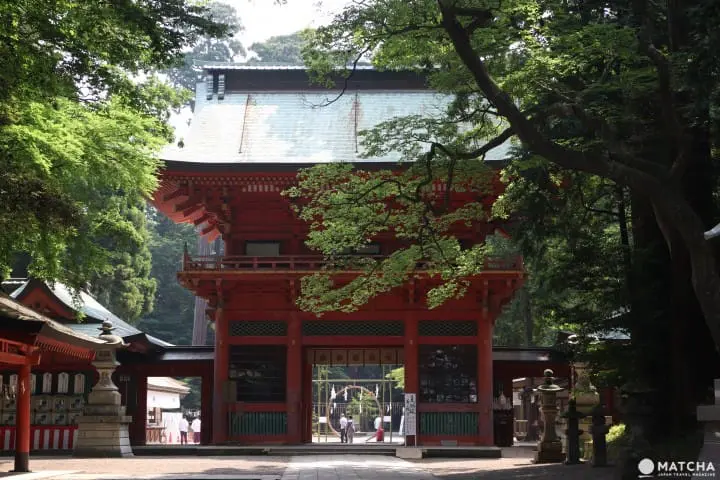
Kashima Jingu, which boasts a rich history, is often paired with Katori Shrine in Chiba Prefecture. Seven buildings, including the honden (main shrine building), haiden (prayer hall), and romon (tower gate entrance), are designated as national important cultural properties.
This is the main shrine among approximately 600 Kashima Shrines throughout Japan. The legend goes that the deer at Kasuga Taisha Shrine in Nara Prefecture, sacred animals believed to be messengers of the gods, are all descendants of the Kashima deer.
9. Mount Tsukuba
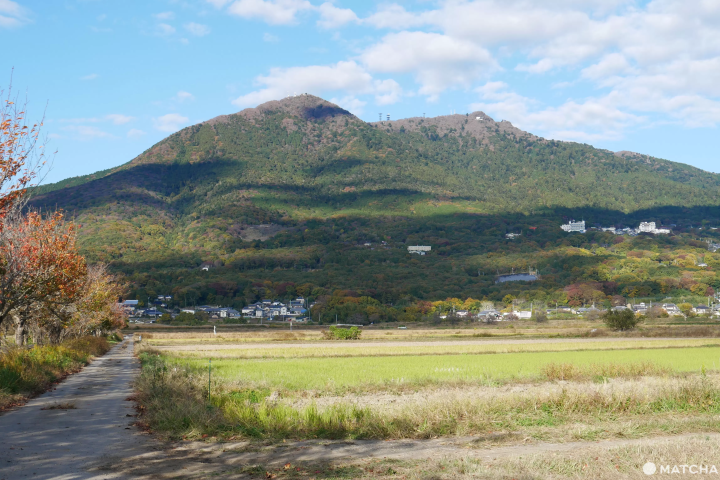
Mount Tsukuba, one of the prominent mountains in the Kanto region, is listed among the "100 Famous Japanese Mountains."
It is frequently compared to Mount Fuji, even referenced as "Fuji in the west, Tsukuba in the east." Visitors can either trek or ride the ropeway to the summit.
10. Ushiku Daibutsu (Giant Buddha Statue)

Ushiku Daibutsu is Japan's tallest bronze Buddha statue.
The inside of the statue is divided into various rooms, and visitors can see the Kanto Plain from the observation deck on the fifth floor. When the weather permits, Tokyo Skytree®︎ and Mt. Fuji can be viewed in the distance. There is also a zoo and a souvenir shop on the grounds.
Driving is the best way to access the statue.
11. Ryujin Suspension Bridge

Photo by Pixta
Those looking for thrills should visit the Ryujin Suspension Bridge in Hitachiota City.
The bridge, which is 446 meters long and 100 meters high, is a prominent spot for bungee jumpers.
Ryujin Gorge, where the bridge is located, is also famous for its autumnal foliage. We recommend visiting this spot by car.
12. Nakaminato Fish Market
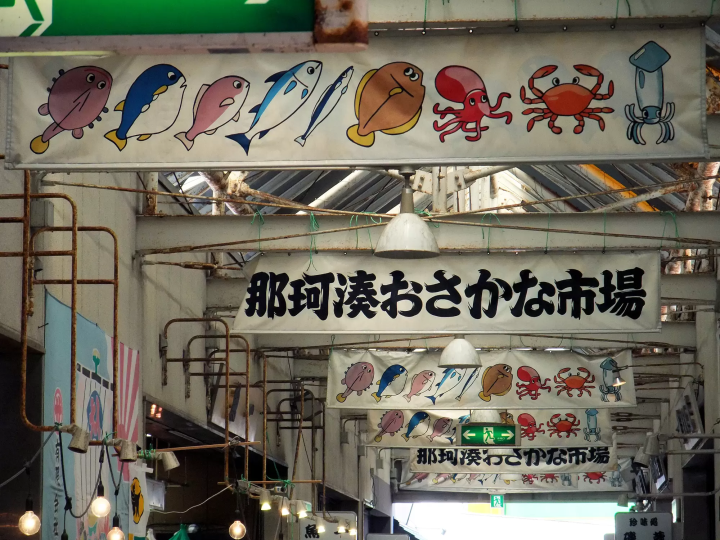
The Ibaraki coast is where the Kuroshio and Oyashio currents meet, making it a fertile fishing ground. As a result, the prefecture is blessed with abundant seafood.
Nakaminato Fish Market is where visitors can savor fresh seafood. It is located near Nakaminato fishing port, which is easily accessible from Tokyo. With seafood restaurants and wholesale stores nearby, tourists flock to the area on holidays.
13. Fukuroda Falls
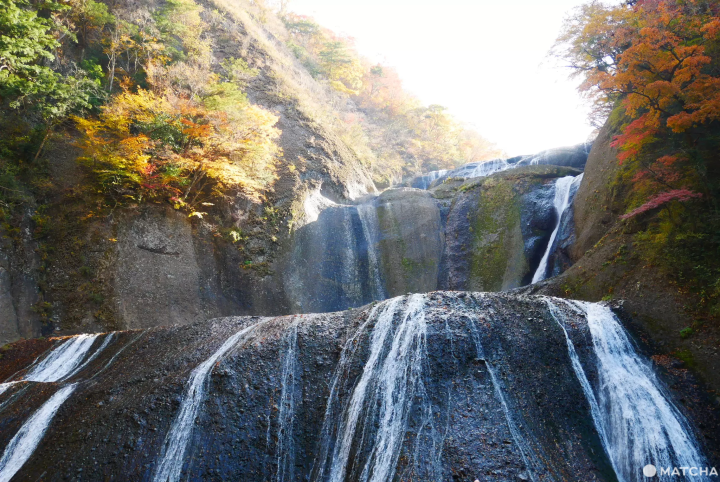
Fukuroda Falls is one of Japan's three most famous waterfalls.
While the scenery changes seasonally, winter is when a rare frozen waterfall greets visitors. Autumn and its foliage may be the second best time to visit.
14. Tsukuba-Kasumigaura Ring-Ring Road

Tsukuba-Kasumigaura Ring-Ring Road is a cycling course running through cities such as Tsukuba, Tsuchiura, Kasumigaura, Sakuragawa, and Itako. The total length is about 180 kilometers.
Everyone, from beginners to advanced cyclists, can have fun on this course.
Course: Old Tsukuba Railway Course/ Lake Kasumigaura Course
Official Website: https://www.ringringroad.com/ (Japanese)
Read also
15. Suigo Itako Iris Garden
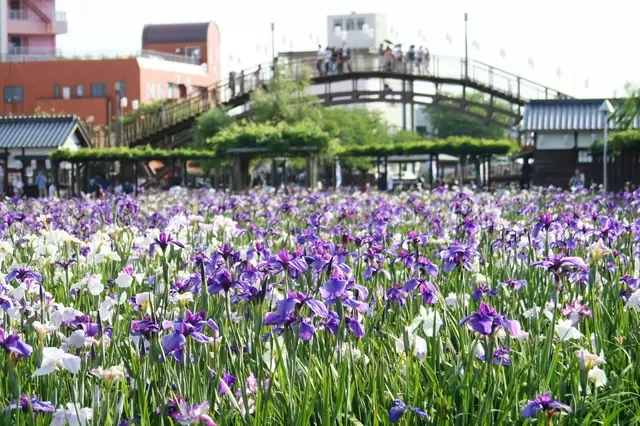
Photo by Pixta
Suigo Itako Iris Garden boasts around 500 types of irises, with a total of one million flowers.
Suigo Itako Iris Festival is held from late May to late July when the flowers are in full bloom. Spectators will be greeted with illuminations and live performances.
Yomeiri-bune, another event held simultaneously, is open to the public. In a pure white traditional Japanese wedding dress, the bride will ride a boat to where the groom waits. People residing overseas can also apply for this event.
16. Oiwa Shrine

Oiwa Shrine has more than 300 years of history.
Mount Oiwa, where the shrine is located, is considered a sacred peak. It is also listed in the "Hitachi no Kuni Fudoki," the oldest book in Japan.
It is said that the lords of the Mito Domain, who ruled a part of modern-day Ibaraki, regularly visited this shrine.
Address: Ibaraki, Hitachi, Irishiken-cho 752
Official Website: https://www.oiwajinja.jp/ (Japanese)
17. Ibaraki Prefectural Museum of History
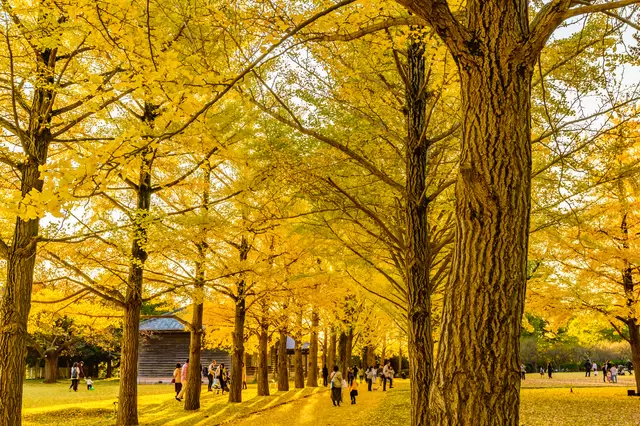
Photo by Pixta
The row of ginkgo trees at the Ibaraki Prefectural Museum of History may not be well known, but it is an ideal place to enjoy the autumnal foliage in November.
The museum displays historical items of the prefecture, including treasures of the Mito Tokugawa family. Since the admission costs 160 yen, it is perfect for those looking for a budget-friendly place to visit!
18. Amabiki Kannon Temple

Picture courtesy of Pixta
Amabiki Kannon Temple (Amabiki-san Rakuho-ji), located in Sakuragawa City, is a famed spot to view hydrangeas. Three thousand flowers bloom annually in June. After they are picked in July, the hydrangeas will float in the pond.
During the cherry blossom season from March to April, the flowers are lit up to create a whimsical atmosphere.
19. Hananuki Gorge
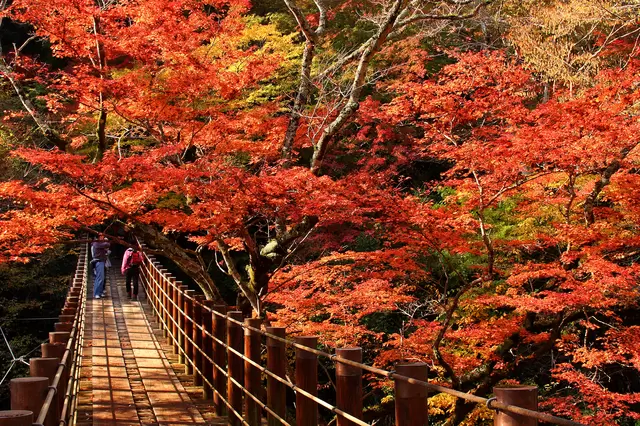
Photo by Pixta
Hananuki Gorge in northern Ibaraki was put on the map after appearing in the Japanese TV drama "Hiyokko." This spot is renowned for its splendid view from Shiomi Falls Suspension Bridge during the autumnal foliage season.
While Takahagi Station is the closest to the gorge, no public transport exists. We recommend driving here.
20. Hitachi Station
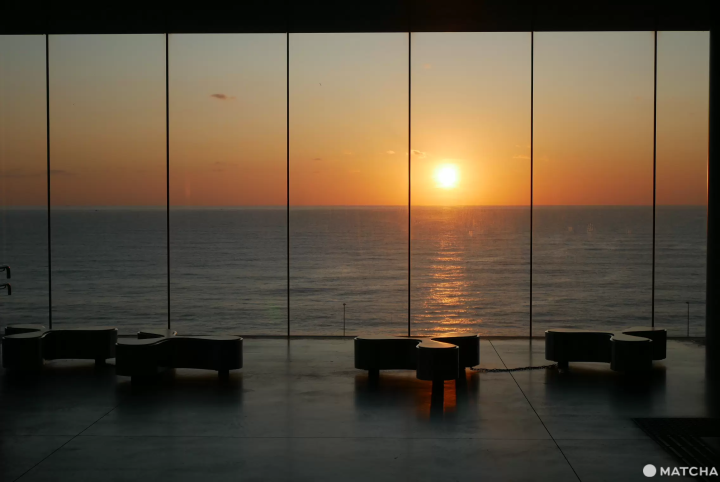
Hitachi Station was designed by Kazuyo Sejima, an internationally acclaimed architect born in Ibaraki.
When the weather permits, the sun rising from the Pacific Ocean can be seen from the station. It is a heavenly sight and an opportunity to bask in solar energy.
21. Osugi Shrine

Osugi Shrine is located in Inashiki City. It is known as Yume-musubi Daimyojin, the only shrine in Japan to make dreams come true.
At most shrines, visitors pray for their health or safety on the road. However, Osugi Shrine has deities who grant specific wishes to visitors.
22. Tsuchiura All Japan Fireworks Competition
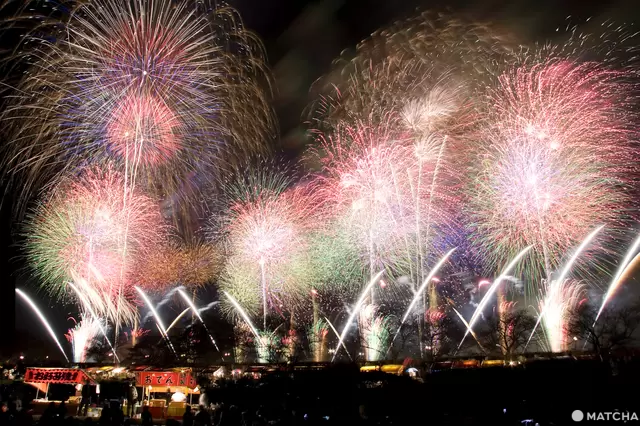
Photo by Pixta
The All Japan Fireworks Competition, held annually in Tsuchiura, is one of the three major competitions in Japan.
The event started in 1925. Craftspeople from Japan gather to show their works among a massive crowd of spectators.
Venue: Near Gakuen Bridge at Sakura River/ Google Map
Official Website: https://www.tsuchiura-hanabi.jp/ (Japanese)
23. Tsukuba Space Center

Photo by Pixta
Tsukuba Space Center, located in Tsukuba City, is a research facility managed by the Japan Aerospace Exploration Agency (JAXA).
Visitors can participate in a guided tour (Japanese) to learn about JAXA and see various instruments used in the field.
24. A Must-Try in Ibaraki! Hitachi Beef

Photo by Pixta
Hitachi beef, ranked from A-4 quality grade and up, can only be raised by cattle breeders with the approval of Ibaraki Prefecture.
Various restaurants serve this celebrated beef, so give it a try if you have the chance!
25. Japanese Sweet Potato Confections - The Latest Hit Souvenir!
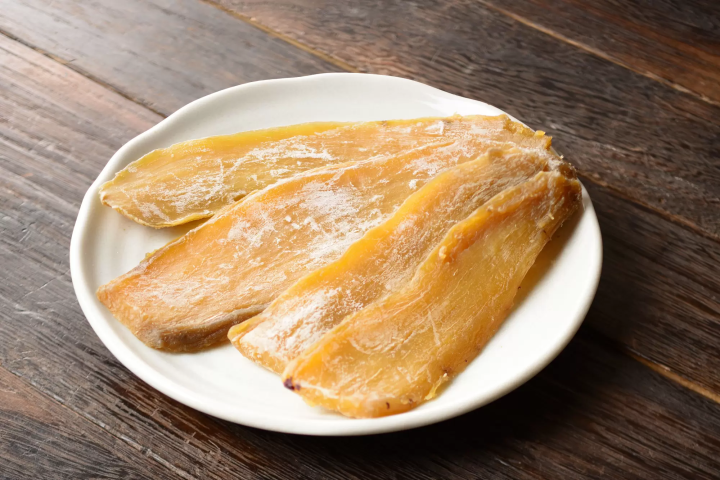
Picture courtesy of Pixta
Satsuma-imo (sweet potato), known for its pleasant taste, is a major product of Ibaraki. It's no surprise that various confections are made with this root vegetable.
Hoshi-imo (dried sweet potato) is a longtime favorite among locals. There are also numerous dishes, including pies, ice creams, and yokan (gelatinous dessert) featuring this ingredient!
26. A Local Delicacy: Monkfish Hot Pot (Anko Nabe)

Photo by Pixta
Monkfish hot pot is a local cuisine made with anglerfish (anko), which dwells in the deep sea.
Many parts of the fish can be used for this dish. Since it also contains a high percentage of collagen, it is said to have a skin-beautifying effect. Although monkfish hot pot is slightly expensive, it should not be missed on your visit to Ibaraki!
27. Hitachi Aki-Soba Noodles - An Autumn Specialty!
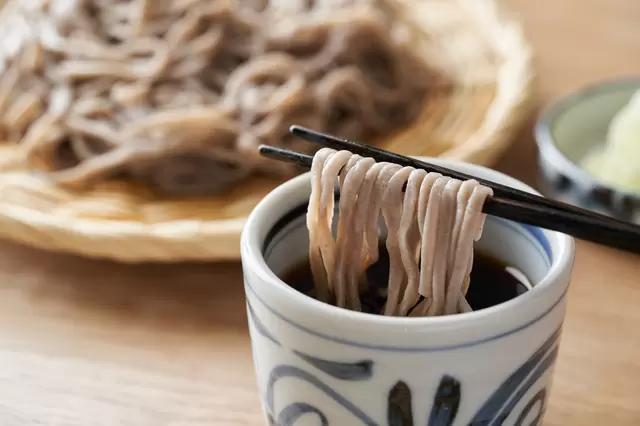
Photo by Pixta
Hitachi Aki-Soba is locally-made buckwheat noodles from Hitachiota City.
Since the best season for this dish is autumn, it is a treat to slurp these soba noodles while enjoying the foliage in Ibaraki.
Accessing Ibaraki: Airplane, JR Lines, and Rental Car
Depending on the departure point of your trip, there are different routes to access Ibaraki. Those booking a direct international flight should head to Ibaraki Airport. From Tokyo, the easiest way to access the prefecture is via train or rental car.
Ibaraki Airport
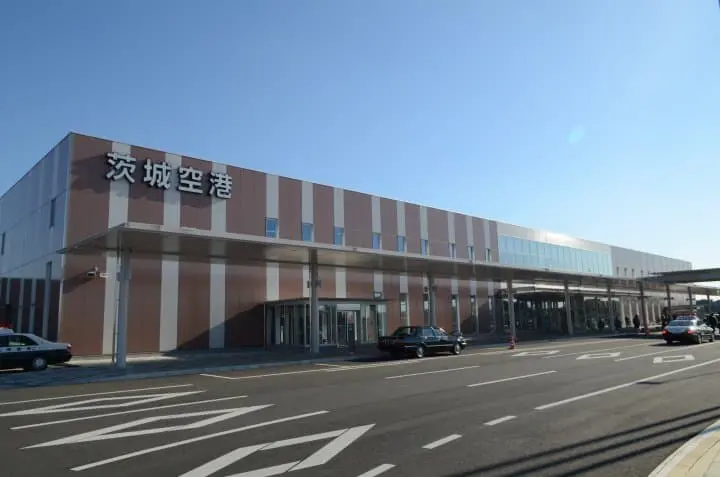
Photo by Pixta
There are direct flights from Taiwan, Vietnam, and Myanmar to Ibaraki Airport.
The airport is also connected to the following domestic airports: Shin-Chitose, Kobe, Fukuoka, and Naha.
Address: Ibaraki, Omitama, Yozawa 1601-55
Official Website: https://www.ibaraki-airport.net/
JR Joban Line
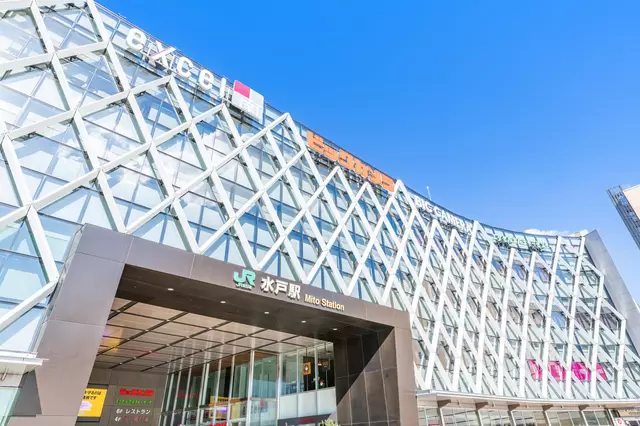
Photo by Pixta
Those heading to Tsuchiura, Mito, or Hitachi from Tokyo should take the limited express Hitachi along the Joban Line.
From JR Tokyo or Ueno Station, it takes about 40 minutes to Tsuchiura, an hour to Mito, and an hour and a half to Hitachi.
If you are planning to ride the JR trains, be sure to purchase the JR Tokyo Wide Pass: a JR East discount ticket for overseas visitors.
Tsukuba Express

The Tsukuba area is accessible by riding the Tsukuba Express, which stops at Akihabara, Asakusa, and Kita-Senju stations.
From Akihabara Station, it takes about 45 minutes to Tsukuba Station on the rapid service train.
Rental Car

A rental car is another option for those interested in driving.
MATCHA is currently offering a 10% off coupon for overseas visitors on Nippon Rent-A-Car vehicles.
We recommend booking a rental car if you want to enjoy a leisure trip or group tour.
Ibaraki: A Place Full of Attractions Awaits!
Ibaraki has once been ranked as the least attractive prefecture in a popularity survey, which may be hard to believe after reading this article.
Those interested in visiting the surrounding areas of Tokyo should definitely pay a visit to Ibaraki!
Main image by Pixta




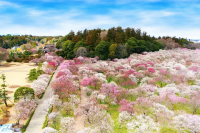


















![[Official] Japan Aerospace Exploration Agency Tsukuba Space Cente...](https://place.matcha-jp.com/resize/200x2000/2022/09/27-21-52-09-4ba2170d3cc896f53efb5c21ced9e60e.webp)
































![[Niigata] Skiing and snowboarding are just not enough! Fun snow spots for parents and children](https://resources.matcha-jp.com/resize/720x2000/2026/01/29-256901.webp)
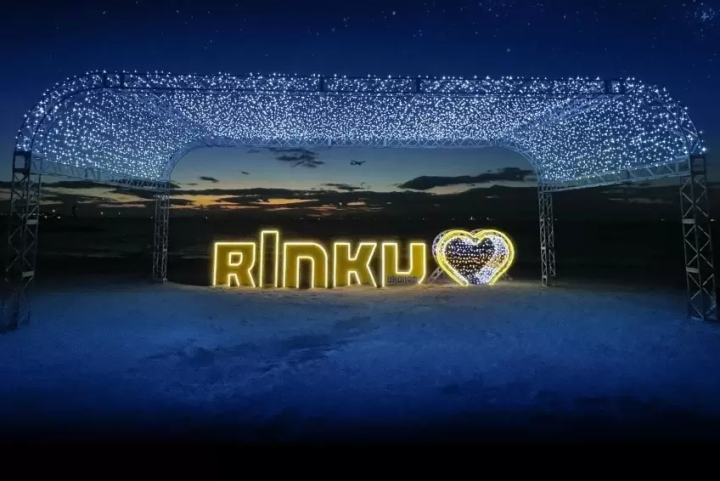
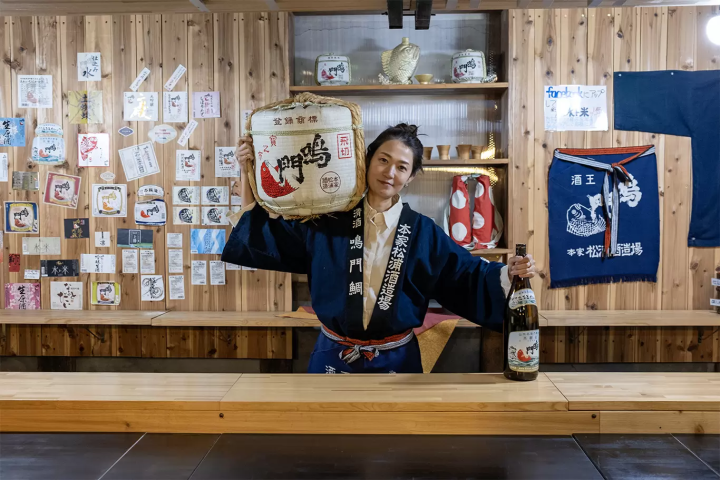
![[Gunma, Nakanojo] Experience Japanese history in a wooden school building from the Meiji era](https://resources.matcha-jp.com/resize/720x2000/2025/12/25-254022.webp)
